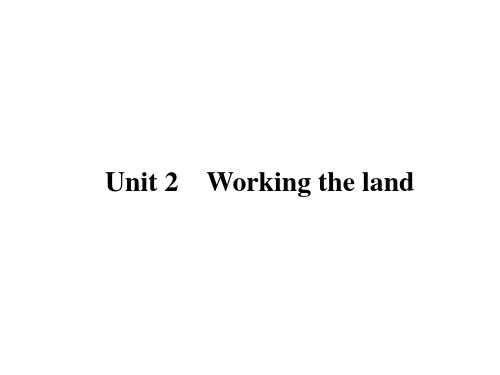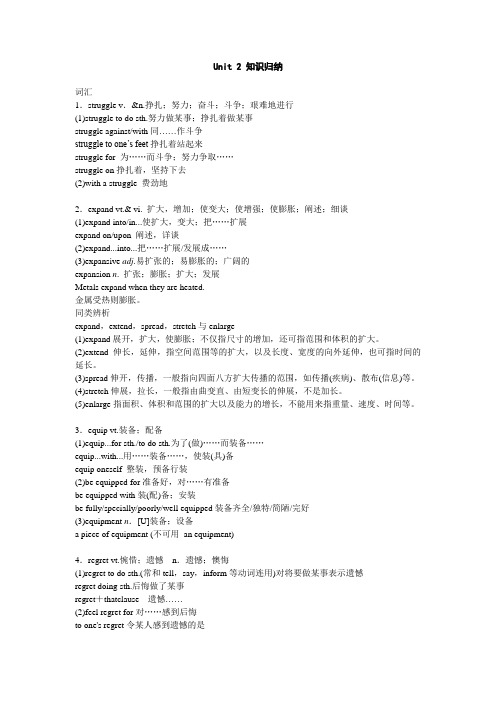必修四unit2单词讲解概要
- 格式:ppt
- 大小:4.65 MB
- 文档页数:46

人教新课标高中英语必修 4 Unit2重点知识点汇总Unit 2 Working the Land核心词汇1.struggle v.挣扎;努力;拼搏;斗争n. (为争取自由、政治权利等而进行的)斗争,奋斗【常用结构】struggle with 与……斗争struggle for 为争取……而斗争struggle against 与……斗争;为反对……而斗争struggle to do sth. (=make great efforts to do sth.) 努力做某事feet 挣扎着站起来struggle to one’sShe struggled to keep back the tears. 她努力忍住泪水。
It was a hard struggle to get my work done on time.为使工作按时完成, 我做了一番努力。
【易混辨析】struggle/fightstruggle 指较长时间的、激烈的斗争,往往指肉体及精神上的战斗。
fight 意为“搏斗,打斗,打架”,表示“斗争”时,包含体力和勇猛的因素。
2.expand v.扩大;扩展;增加;增长;(使)膨胀;阐述;使变大【常用结构】expand...into... 将……扩展/发展成……expand on 阐述;详谈He is thinking of expanding his business.他在正考虑扩大他的生意。
population expanded by 12%.In ten years the c ity’s十年之中,该市人口增加了百分之十二。
【联想拓展】expansion n.展开;膨胀;扩展expansive a dj.广阔的;易膨胀的【易混辨析】expand/extend/spread/stretchexpand 意为“展开,扩大”,不仅指尺寸的增加,还可指范围和体积的扩大。
extend 意为“伸出,延伸”,指空间范围的扩大,以及长度,宽度的向外延伸,也可指时间的延长。



核心词汇第一部分:1.confuse 英[kənˈfju:z]动词, 表示“把(某人)弄糊涂; 使迷惑”, “搞乱; 混淆”。
例句:It is important to explain this again or we will confuse the students.用法:1)My Chinese and English books are confused together.我的中英文的书籍混在一起了。
Please don’t confuse Australia with Austria. 别把澳大利亚和奥地利混淆了。
2)confusion n. 混乱; 慌乱; 混淆There's still confusion about the number of casualties.伤亡人数依然不明。
We always left his office in a state of confusion.我们总是一头雾水地离开他的办公室。
Omissions in my recent article must have caused confusion.我最近一篇文章中的几处省略肯定造成了困惑。
3)confusing和confused辨析:这两个词都是由confuse转化而来的形容词。
confusing意思是“莫名其妙的; 难以理解的(difficult to understand; puzzling)”, 强调事物本身所具有的性质; confused 意思是“糊涂的; 迷乱的(unable to think clearly)”, 强调人对某事物的感受。
The statement is highly confusing.这一声明十分费解。
The uncertainty created by this situation must be confusing for you.这种局面所造成的不确定性肯定让你感到困惑。

Unit 2 知识归纳词汇1.struggle v.&n.挣扎;努力;奋斗;斗争;艰难地进行(1)struggle to do sth.努力做某事;挣扎着做某事struggle against/with同……作斗争struggle to one’s feet挣扎着站起来struggle for 为……而斗争;努力争取……struggle on挣扎着,坚持下去(2)with a struggle 费劲地2.expand vt.& vi. 扩大,增加;使变大;使增强;使膨胀;阐述;细谈(1)expand into/in...使扩大,变大;把……扩展expand on/upon 阐述,详谈(2)expand...into...把……扩展/发展成……(3)expansive adj.易扩张的;易膨胀的;广阔的expansion n. 扩张;膨胀;扩大;发展Metals expand when they are heated.金属受热则膨胀。
同类辨析expand,extend,spread,stretch与enlarge(1)expand展开,扩大,使膨胀;不仅指尺寸的增加,还可指范围和体积的扩大。
(2)extend伸长,延伸,指空间范围等的扩大,以及长度、宽度的向外延伸,也可指时间的延长。
(3)spread伸开,传播,一般指向四面八方扩大传播的范围,如传播(疾病)、散布(信息)等。
(4)stretch伸展,拉长,一般指由曲变直、由短变长的伸展,不是加长。
(5)enlarge指面积、体积和范围的扩大以及能力的增长,不能用来指重量、速度、时间等。
3.equip vt.装备;配备(1)equip...for sth./to do sth.为了(做)……而装备……equip...with...用……装备……,使装(具)备equip oneself 整装,预备行装(2)be equipped for准备好,对……有准备be equipped with装(配)备;安装be fully/specially/poorly/well equipped装备齐全/独特/简陋/完好(3)equipment n.[U]装备;设备a piece of equipment (不可用an equipment)4.regret vt.惋惜;遗憾n.遗憾;懊悔(1)regret to do sth.(常和tell,say,inform等动词连用)对将要做某事表示遗憾regret doing sth.后悔做了某事regret+thatclause遗憾……(2)feel regret for对……感到后悔to one's regret令某人感到遗憾的是It's to be regretted that...令人遗憾的是……with great/deep regret很遗憾5.focus n.集中点,焦点,调焦;兴趣或注意力的中心vt.&vi.(使)聚焦,(使)集中精力于……(1)focus one's eyes/energy/mind/attention on sth.把某人的眼神/精力/思想/注意力集中于某物(2)focus on/upon sth.(某人)把注意力集中于某物(3)out of focus模糊不清/焦点没有对准的in focus清晰的/焦点对准的bring sth.into focus使……成为关注的焦点the focus of attention/concern注意力/关注的焦点6.reduce vt. 缩减,减少;使……处于……状态(表示此种意义时,常用于被动语态);使变弱;使降职(级)(1)reduce sth.(from sth.) to...把……减少到……reduce sth.(from sth.) by...把……减少了……be reduced to...沦落为……be reduced to despair 陷入绝望reduce sb.(from sth.) to...把某人(从某级别或职位)降至……(2)reduction n.减少,缩减;折扣;减价make a reduction减价(3)(反)increase v.增加,增长,增大7.comment n.&vi.评论,注释,意见(1)make comments on/upon sth.评论某事without comment不必多说no comment无可奉告(2)comment on/upon评论,谈论,对……提意见comment that...评论……He made several comments on the film.他对这部电影作出了许多评论。

高一外语必修4unit2知识点高一外语必修4 Unit2 知识点Unit2是高一外语必修4教材中的一单元,主要涵盖了关于犯罪与法律的话题。
本文将详细介绍Unit2中的一些重要知识点,以帮助学生更好地理解和掌握这一单元内容。
一、单词与短语1. robbery (noun): 抢劫The police are investigating the robbery that took place at the bank yesterday.(警方正在调查昨天在银行发生的抢劫案。
)2. murder (noun): 谋杀The detective was able to solve the murder case and bring the killer to justice.(这名侦探成功破案,将凶手绳之以法。
)3. burglary (noun): 入室盗窃The house was empty when the burglary happened, so nobody saw the thief.(当入室盗窃案发生时,房子里空无一人,所以没人看到小偷。
)4. suspect (noun): 嫌疑犯The police arrested a suspect in connection with the robbery.(警方逮捕了一名与抢劫有关的嫌疑犯。
)5. evidence (noun): 证据The detective collected a lot of evidence at the crime scene.(这名侦探在犯罪现场收集了大量的证据。
)二、被动语态在Unit2中,我们需要掌握被动语态的用法。
被动语态是表示主语是动作的接受者的一种句式。
构成被动语态的基本结构为:“be + 过去分词”。
例如:Active: The police caught the thief.Passive: The thief was caught by the police.被动语态常用于描述某一行为的执行者不明确或不重要的情况下。
Review Book ④Unit2一、V-ing1. 动词-ing形式的构成: 是在动词末尾加-ing 形式构成, 因此又叫动词的-ing 形式。
如: do-doing, be-being, ask-asking, etc. 否定形式: not+ -ing 构成2. 动词-ing形式不能单独作谓语, 没有人称和数的变化, 但可以有自己的宾语和状语, 还有时态和语态的变化。
3. 动词-ing形式由动词加-ing变化而成, 它同时具有名词和动词的特征, 在句中可以作主语、宾语等。
①动词-ing形式作主语1.表示经常的、习惯性的动作或状态, 谓语动词通常用单数。
如:Walking is a good form of exercise for both young and old.无论对年轻人和老年人来讲, 走路是一种很好的锻炼。
2. -ing形式作主语时常后置, 此时须用it作形式主语, 用形容词或名词作表语。
常见的名词或名词短语有: no use, no good, fun, hard work, a hard / difficult job, a waste of time 等; 形容词有: dangerous, worthwhile, useless等。
3. 在there be 结构中作主语, 这种结构的意思相当于“It is impossible to do… ”。
如:若要人不知, 除非己莫为。
There is no hiding of evil but not to do it.△、动名词与不定式做主语时的比较:动名词表示的动作通常是一个泛指的动作,不定式则通常表示具体的动作。
如:还是个孩子的时侯, 她就觉得探视病人是一种责任, 也是一种愉悦。
As a child, she felt that visiting sick people was a duty and a pleasure.△、归纳: 常用-ing形式作主语的句型有:⏹It +be +a waste of time doing 做……是浪费时间的⏹It is/was no good/use doing 做……是没用处的⏹It is/was hardly/scarcely worth doing 做……不值得⏹It is/was worth/worthwhile doing 做……是值得的⏹There is no doing... 无法……; 不允许……There is no sense in doing 做……没有道理There is/was no use doing 干……无意义There is/was nothing worse than doing 没有比……更糟的There is/was no point doing 干……无意义注意: There is no need to do sth 干……没必要, 在此句式中to do 不可换为doing.没有必要告诉她。
重点单词(必修 4 Unit 2 Working the land)(讲义)高中英语重点单词(必修 4 Unit 2 Working the land)1. 学习单词,注意重点单词的用法并灵活运用这些单词。
2. 掌握regret作为动词和名词的用法以及其所构成的固定搭配。
重点:struggle, equip, confuse, regret, focus 难点:regret的用法一、重点单词【单词学习】1. struggle vi. & n. 斗争;拼搏;努力;挣扎struggle to one’s feet挣扎着站起来with a struggle 费劲地It is a struggle for sb. to do sth.对某人来说做某事是很艰难的They asked for civil rights, for which they had struggled for hundreds of years.他们要求民权,并为此奋斗了几百年。
On arriving at the shore, the girl struggled up the cliff towards the light she had seen.到达岸边后,姑娘朝着她看到的灯光方向挣扎着往峭壁上爬去。
He has been struggling to succeed in his business.=He has been struggling for success in his business.为使事业成功,他一直努力奋斗着。
It is a struggle for me to keep my room and以使用更少的农田进行耕种。
We want our son to have a good education that will equip him for later life.我们想让儿子接受良好的教育以便能为其今后的生活打下基础。